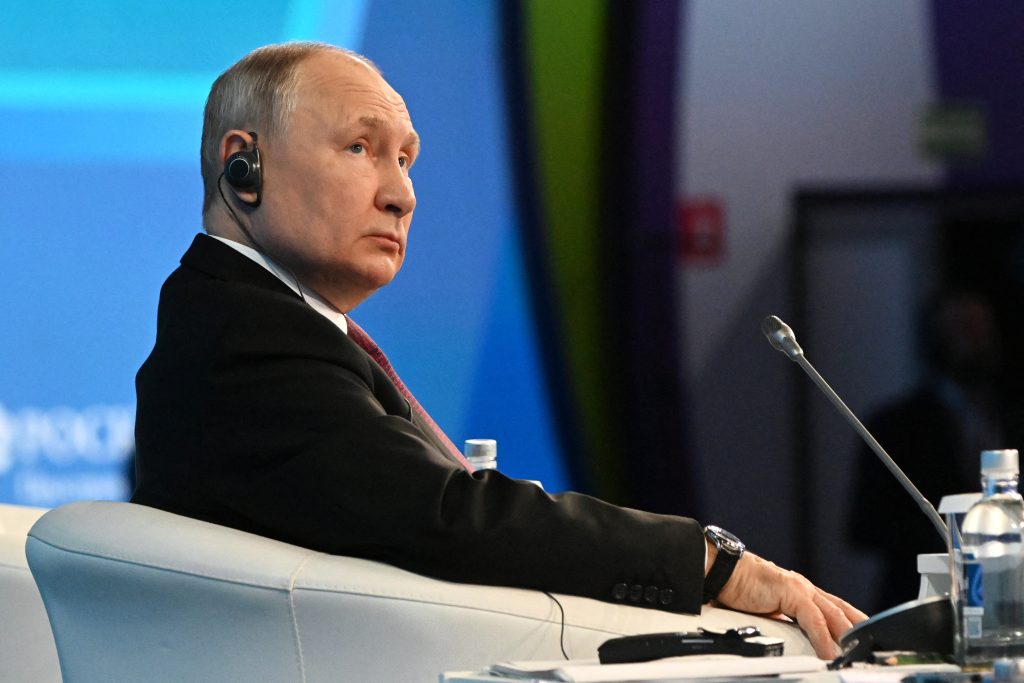Fashion 2023, Uncategorized
Putin says U.S. is inflaming Middle East by sending aircraft carrier group
Introduction
Vladimir Putin, the President of Russia, has recently accused the United States of inflaming the Middle East by sending an aircraft carrier group to the region. Putin believes that the US is attempting to provoke a conflict in the region and is using the deployment of the aircraft carrier group as a way to do so. He has also expressed his concern that the US is not taking into account the interests of other countries in the region. Putin’s comments come at a time of heightened tensions in the Middle East, with the US and its allies on one side and Russia and its allies on the other.
How Putin’s Comments on U.S. Presence in the Middle East Could Impact International Relations
Russian President Vladimir Putin’s recent comments on the U.S. presence in the Middle East have the potential to significantly impact international relations. Putin has stated that the U.S. presence in the region is destabilizing and has called for a reduction in U.S. forces. This could lead to a shift in the balance of power in the region, as the U.S. has been a major player in the Middle East for decades.
The U.S. has long been a major player in the Middle East, providing military and economic support to its allies in the region. A reduction in U.S. forces could lead to a power vacuum that could be filled by other countries, such as Russia or Iran. This could lead to increased tensions between the U.S. and its allies, as well as between the U.S. and its adversaries.
Furthermore, a reduction in U.S. forces could lead to a decrease in stability in the region. The U.S. has been a stabilizing force in the Middle East, and a decrease in U.S. forces could lead to increased violence and instability. This could have a ripple effect, leading to increased tensions between countries in the region and beyond.
Finally, a reduction in U.S. forces could lead to a decrease in U.S. influence in the region. The U.S. has long been a major player in the Middle East, and a decrease in U.S. forces could lead to a decrease in U.S. influence in the region. This could lead to a shift in the balance of power in the region, as other countries could gain more influence.
In conclusion, Putin’s comments on the U.S. presence in the Middle East have the potential to significantly impact international relations. A reduction in U.S. forces could lead to a shift in the balance of power in the region, increased tensions between countries, decreased stability, and a decrease in U.S. influence. It remains to be seen how these changes will play out, but it is clear that Putin’s comments have the potential to have a major impact on international relations.
Exploring the Potential Consequences of Putin’s Criticism of U.S. Military Activity in the Middle East
The recent criticism of U.S. military activity in the Middle East by Russian President Vladimir Putin has raised serious concerns about the potential consequences of such a move. This criticism has been seen as a direct challenge to the United States’ long-standing policy of maintaining a presence in the region, and it has the potential to create a number of serious geopolitical issues.
First, the criticism could lead to increased tensions between the United States and Russia. This could manifest itself in a number of ways, including increased military activity in the region, increased economic sanctions, or even a direct military confrontation. Such a confrontation could have devastating consequences for the region and the world at large.
Second, the criticism could lead to increased instability in the Middle East. This could be caused by a number of factors, including increased support for extremist groups, increased economic instability, or increased political unrest. Such instability could lead to further conflict and violence in the region, which could have devastating consequences for the people of the Middle East.
Third, the criticism could lead to a decrease in U.S. influence in the region. This could be caused by a number of factors, including a decrease in U.S. military presence, a decrease in economic aid, or a decrease in diplomatic engagement. Such a decrease in influence could lead to a decrease in U.S. influence in the region, which could have serious implications for U.S. interests in the region.
Finally, the criticism could lead to a decrease in international cooperation in the region. This could be caused by a decrease in trust between the United States and other countries in the region, or a decrease in willingness to cooperate on issues such as counterterrorism or economic development. Such a decrease in cooperation could have serious implications for the stability of the region and the world at large.
In conclusion, the recent criticism of U.S. military activity in the Middle East by Russian President Vladimir Putin has the potential to create a number of serious geopolitical issues. These issues could include increased tensions between the United States and Russia, increased instability in the Middle East, a decrease in U.S. influence in the region, and a decrease in international cooperation in the region. It is therefore essential that the United States and other countries in the region take steps to ensure that such criticism does not lead to further instability and conflict in the region.
Analyzing the Impact of Putin’s Accusations of U.S. Inflaming the Middle East
The recent accusations made by Russian President Vladimir Putin that the United States is inflaming the Middle East have caused a stir in international relations. Putin’s claims have been met with both criticism and support, and it is important to analyze the potential impact of these accusations.
First, it is important to consider the implications of Putin’s accusations on the relationship between the United States and Russia. Putin’s claims have been seen as a direct challenge to the United States’ foreign policy in the region, and it is likely that this will lead to increased tensions between the two countries. This could have a negative effect on the already strained relationship between the two countries, and could lead to further diplomatic disputes.
Second, it is important to consider the potential impact of Putin’s accusations on the Middle East itself. Putin’s claims have been seen as an attempt to shift the blame for the region’s instability away from Russia and onto the United States. This could lead to increased animosity between the two countries, and could potentially lead to further conflict in the region. Additionally, it could lead to a decrease in international cooperation in the region, as countries may be less willing to work together if they believe that the United States is to blame for the region’s instability.
Finally, it is important to consider the potential impact of Putin’s accusations on the international community as a whole. Putin’s claims have been seen as an attempt to undermine the United States’ credibility in the international arena, and this could lead to a decrease in trust in the United States’ foreign policy. This could have a negative effect on the United States’ ability to effectively engage in international diplomacy, and could lead to further instability in the region.
In conclusion, it is clear that Putin’s accusations of the United States inflaming the Middle East have the potential to have a significant impact on international relations. It is important to consider the implications of these accusations on the relationship between the United States and Russia, the Middle East itself, and the international community as a whole.
Examining the Political Motivations Behind Putin’s Criticism of U.S. Aircraft Carrier Group in the Middle East
The recent criticism of the United States’ aircraft carrier group in the Middle East by Russian President Vladimir Putin has raised questions about the political motivations behind his words. In order to better understand the situation, it is important to examine the context in which the criticism was made.
The United States has been increasing its military presence in the Middle East in recent years, with the deployment of the aircraft carrier group being the latest example. This has been seen as a direct challenge to Russia’s influence in the region, as well as a sign of U.S. commitment to its allies in the region. In response, Putin has been vocal in his criticism of the move, calling it “provocative” and “dangerous.”
It is clear that Putin’s criticism of the U.S. aircraft carrier group is politically motivated. By publicly denouncing the move, Putin is attempting to reassert Russia’s influence in the region and demonstrate that it is not intimidated by U.S. military presence. Additionally, Putin is likely attempting to curry favor with other countries in the region, as well as with his own domestic audience, by appearing to stand up to the United States.
Ultimately, Putin’s criticism of the U.S. aircraft carrier group is a reflection of the geopolitical tensions between the two countries. While the move may be seen as provocative by some, it is important to understand the political motivations behind Putin’s words in order to gain a better understanding of the situation.
Conclusion
In conclusion, President Putin’s statement that the United States is inflaming the Middle East by sending an aircraft carrier group is a reflection of the current geopolitical tensions between the two countries. While the United States may have its own reasons for sending the group, it is clear that the move has been perceived as a provocation by Russia and other countries in the region. As such, it is important for both sides to work together to de-escalate the situation and find a peaceful resolution.
From: Salaslove Store
See more: Chicago White Sox Major League Baseball MLB Baseball Jersey Shirt Custom Name _ Number


